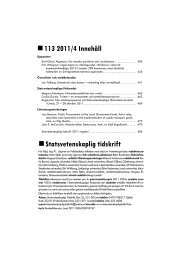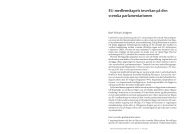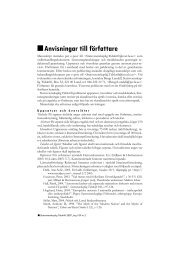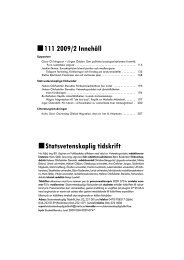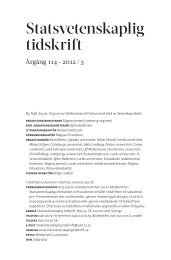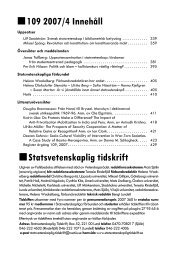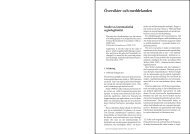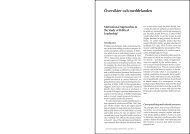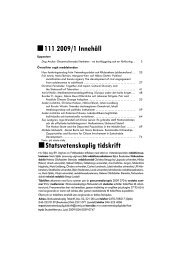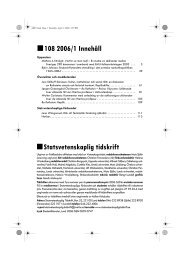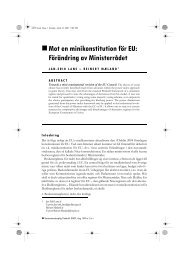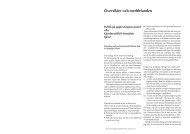Hela nummer 2007/1 (PDF, 2047 kb) - Statsvetenskaplig tidskrift
Hela nummer 2007/1 (PDF, 2047 kb) - Statsvetenskaplig tidskrift
Hela nummer 2007/1 (PDF, 2047 kb) - Statsvetenskaplig tidskrift
You also want an ePaper? Increase the reach of your titles
YUMPU automatically turns print PDFs into web optimized ePapers that Google loves.
st071.book Page 78 Sunday, March 4, <strong>2007</strong> 5:48 PM<br />
78<br />
ject. Here are some more questions which<br />
could be asked for the sake of stimulating<br />
further discussion: is federalism an ‘empty<br />
signifier’ which could be filled with different<br />
readings? Is it a kind of “elite game”<br />
which makes it different from the idea of<br />
democracy? The Russian community of<br />
political scientists will certainly be eager to<br />
get more perspectives on these matters<br />
from their Swedish colleagues in the future.<br />
References<br />
Zizek, Slavoj, 2003. The Puppet and the Dwarf. The<br />
Perverse Core of Christianity. Cambridge and London:<br />
the MIT Press.<br />
Replik från Johnny Rodin<br />
The federal reforms that were introduced<br />
during Putin’s first presidential term<br />
(2000-2004) surprised me in several ways.<br />
Their scope and degree of centralization<br />
were far-reaching. All previous attempts<br />
of federal authorities during the 1990s to<br />
redistribute powers in this way had failed.<br />
However, this time around these supposedly<br />
controversial policies were accepted,<br />
or even hailed, not only by political actors<br />
at the federal level, but also by many regional<br />
leaders.<br />
As Andrey Makarychev pointed out in<br />
his analysis of my dissertation I approached<br />
this puzzling development from<br />
an ideational perspective. Deriving from a<br />
basically moderate constructivist perspective<br />
I employed the more concrete theorizing<br />
of historical institutionalism (represented<br />
by scholars such as Peter Hall,<br />
Margaret Weir, March and Olsen, and<br />
John Kingdon) to understand the transformation<br />
process of intergovernmental<br />
relations in Russia. In the end I found that<br />
a shift of federal paradigms, which fol-<br />
lowed the political and economic crisis in<br />
1998, constituted an important part of<br />
this process. Mr Makarychev notices the<br />
similarities of this approach with<br />
Foucault’s genealogical perspective. This<br />
is an interesting observation. Throughout<br />
my research process I based my thinking<br />
rather on the theorizing of Thomas<br />
Kuhn. The connections between<br />
Foucault and Kuhn are undeniably interesting.<br />
Intriguingly, although they are<br />
contemporaries, I cannot find that they<br />
refer to each other. This is definitely a topic<br />
that could be explored further.<br />
One central difference between the federal<br />
paradigm of the Yeltsin era and that<br />
of the Putin era concerns the acceptable<br />
level of judicial asymmetry. While asymmetry<br />
had been part of the modus operandi<br />
of the Russian federal system throughout<br />
the 1990s, it became almost a taboo at the<br />
turn of the millennium. The ban of asymmetry<br />
was welcomed by a clear majority<br />
of governmental actors, which in the end<br />
contributed to more harmonious intergovernmental<br />
relations. However, I do<br />
not claim, as stated by Mr Makarychev,<br />
that ‘symmetry is semantically related with<br />
cooperation and harmony, while asymmetry,<br />
is rooted in specific group politics<br />
and, therefore, connotes with fragmentation<br />
and rivalry’. This is a highly debated<br />
issue within federal studies and there is no<br />
established theoretical consensus. Rather,<br />
it appears to be an empirical question.<br />
Therefore, my conclusions concerning<br />
symmetry/asymmetry and the level of<br />
intergovernmental cooperation apply<br />
mainly to the Russian case.<br />
Andrey Makarychev also brings up the<br />
interesting point regarding to what extent<br />
Putin is a political subject in the terminology<br />
of Carl Schmitt and Slavoj Zizek. Indeed,<br />
although I do not discuss the issue<br />
in those terms I think it is important to



